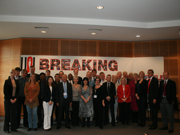News
UNI Management Committee supports organising and outreach

The plan sets an ambitious goal for UNI to support its affiliates as they build the power of unions and support organising globally. Breaking Through will set UNI and its affiliates on a path to strengthening and expanding union membership around the world as they head to their next World Congress in Cape Town in 2014.
“UNI is committed to ‘Breaking Through’ on trade union rights and supporting our affiliated unions in their fight to organise and bargain collectively for some 20 million workers around the world,” said General Secretary Philip Jennings. “The global financial crisis has been a huge challenge for us but international union solidarity is essential if we want to ensure a better future for the world’s workers and their families.”
UNI has set a target of signing 50 global agreements to protect union rights with multinational companies by its Congress. These agreements are a cornerstone of UNI’s drive to ensure that corporate giants respect international labour standards and basic rights for workers and that they do not lead a race to the bottom by choosing to employ workers in the countries that offer the least protection.
Currently UNI has 36 such agreements, which span its sectors and regions all over the world.
At its meeting in Nyon on May 4-5, the Management Committee pledged its support for joint action to push jobs, workers’ rights and financial regulation as the just response to the financial crisis.
The global economic crisis was caused by mistakes made by fat cat bankers but it is the world’s workers who are paying the price, said UNI General Secretary Philip Jennings.
The global union movement has been pushing for a tax on financial institutions. At the G20 meeting in Pittsburgh in 2009 UNI General Secretary Philip Jennings coined the term “fat cat tax.”
UNI supports the creation of a tax to ensure banks pay for bailouts but it would not support a tax that takes money from lower-level workers who do not bear any responsibility for the most recent financial crash.
UNI’s key challenges include developing strategies to come out of the global financial crisis with government recovery plans that put people back to work, fighting staggering income inequality and ensuring workers in every corner of the world have the right to organise and bargain collectively. UNI is also facing head on the threats from climate change and from the build up of nuclear weapons.
Some 2000 trade unionists from around the world will come together in Nagasaki, Japan, in November for the UNI Global Union 3rd World Congress, which will set the course for UNI’s future.
The UNI Congress will coincide with a G20 meeting in Korea and the APEC summit in Tokyo during the same week in November, when the eyes of the world will be on the region. UNI plans to capitalize on the attention to get its powerful message out to the media and the public.
“Our message is clear. For the world’s workers, the only way to successfully come out of the global financial crisis will be with government recovery plans that put people back to work, fight staggering income inequality and ensure workers in every corner of the world have the right to organise and bargain collectively,” said UNI President Joe Hansen.
The UNI Liaison Council of Japan has been enthusiastically and meticulously planning the events in Nagasaki.
In honour of the UNI World Congress, our host city will add a tram emblazoned with the UNI logo and Breaking Through theme. There will also be an official Japanese stamp for the Congress.
Along with endorsing Breaking Through, the Management Committee also approved plans to increase women’s representation in UNI’s political structure and to continue reaching out to grassroots members on international campaigns. They also supported new UNI initiatives to recognise affiliates who have had organising break throughs or been instrumental in using their trade union to promote world peace. Prizes will be awarded at the Congress.
The committee considered a report on the next 10 years for UNI told through the eyes of six individuals in different parts of the world and different working conditions.
The Management Committee thanked Deputy General Secretary Philip Bowyer, who will soon retire, for his brilliant contributions to help build UNI into the strong organisation it is today.
The also welcomed his successor Christy Hoffman, who will assume her role in Augst. Hoffman is a trade union leader and lawyer from the United States who was previously the head of UNI Property Services.
The Management Committee meeting followed a meeting of the Solidarity Support Organisations (SSO) who have been supporting the work of UNI and its member unions for many years. UNI’s Head of Strategic Campaigns and Organising (SCORE) Adriana Rosenzvaig explained how her department will focus on projects supporting union organising and building union power.
(left to right) UNI President candidate Joe DeBruyn, Retiring Deputy General Secretary Philip Bowyer, Newly Hired Deputy General Secretary Christy Hoffman, Retiring President Joe Hansen, General Secretary Philip Jennings
General Secretary Philip Jennings, Retiring Deputy General Secretary Philip Bowyer and one of the world's future union leaders.

